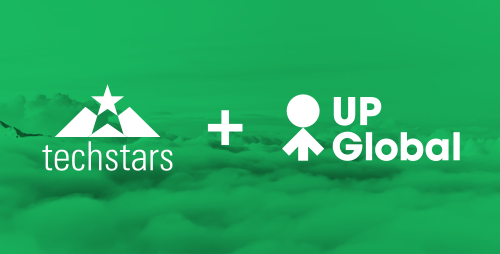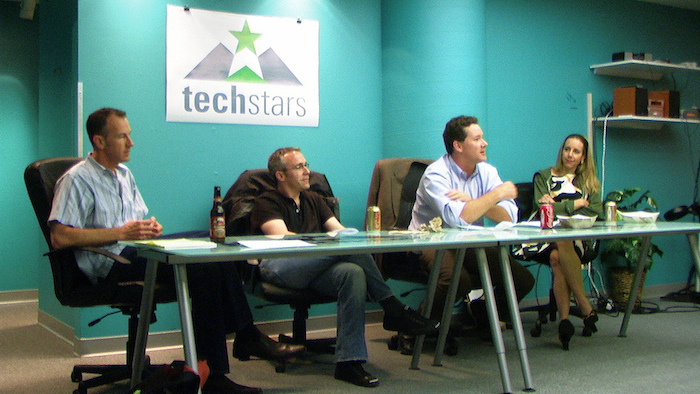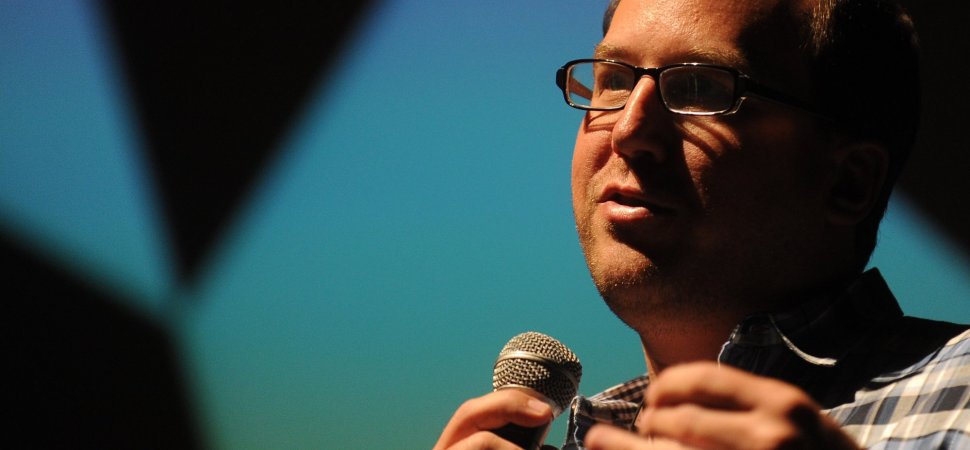Techstars + UP Global: New opportunities for startups around the world

TechStars Accelerator has absorbed the UP Global structure, including its Startup Weekend, Startup Week, Startup Next and Startup Digest programs.
TechStars, one of the leading US accelerators, acquired UP Global, a nonprofit structure that works in the field of entrepreneurship education, in an attempt to cover all stages of creating a business from an idea to an IPO.
')
“Together, we will help accelerate the pace of innovation development by supporting entrepreneurs in the initial stages, providing the best opportunities in the startup community, and also help shape the entrepreneurial ecosystem all over the world.”
Background
From the first days of its foundation, Startup Weekend was closely associated with TechStars. Andrew Hyde registered Startup Weekend in 2007, and the first events in Startup Weekend were held with teams from TechStars. After some time, Startup Weekend and its business community formed into a structure called UP Global, becoming a non-profit project, then other programs were launched - Startup Digest and Startup Next (now these programs are TechStars pride). The UP Global project came to light from the TechStars basements in Seattle, and since the summer of 2014, companies have again divided offices in Startup Hall.
Now a non-profit organization with headquarters in Seattle is known as the parent company that monitors Startup Weekend events: 54-hour sprints, which are held in cities around the world, where people share their ideas, form teams and think out new business plans. . UP Global also conducts the Startup Digest online newsletter and other educational and networking activities for start-ups and interested people.
David Cohen, managing partner and co-founder of TechStars, said in an interview: “TechStars, since 2006, has been shaping the world's first truly global business ecosystem. Startup Weekend and other UP Global programs did an amazing job: they inspired and educated entrepreneurs around the world, provided the most promising companies with venture capital. In short, they had a strong influence on the economy. ”
Regardless of how both projects worked before the merger, they share a common mission: to introduce as many people from different parts of the world as possible to entrepreneurship. TechStars and UP Global went to this goal differently, but over the past 7 years, both organizations have been working to improve the global state of entrepreneurship by introducing a new way of thinking (“give first, then get something in return”) and focus on learning through experience .

Now TechStars can offer a whole range of programs that fully correspond to the Entrepreneur's Journey model and combine two of the world's largest startup ecosystems.
Mark Neiger, CEO of UP Global, and now Chief Community Officer (CCO) at TechStars: “Together, we created programs and resources for each stage of the Entrepreneurial Path: from accelerators that focus on the early development of start-up communities to entrepreneurs looking for formal opportunities to provide projects with knowledge, mentoring support, financing and much more. ”
David Cohen believes that if we talk about all stages of the Path of the entrepreneur from an idea to an IPO, UP Global focuses on inspiration and education. But in order to grow, businesses also need capital, and, given that the amount currently used by TechStars reaches $ 300 million, the company will continue to provide assistance to the most promising startups, which ultimately provide the investment with the most long-term economic effect.
As a result of the merger, a global ecosystem of all leaders, founders, mentors, investors, and corporate partners may emerge, who will now work even harder together to support entrepreneurs and their communities.
What's next?
The Google For Entrepreneurs project will continue to work with TechStars, support Startup Weekend and Startup Next. Moreover, from now on, fees associated with Startup Next, the former UP Global pre-acceleration program, will be canceled - this will allow more entrepreneurs to take advantage of this opportunity to expand their business.
When combined, TechStars will not receive any preferences regarding redirecting the flow of transactions to its native acceleration programs. There are also no major changes planned for Startup Weekend and other UP Global-led programs, now called TechStars Community Programs.
Big plans
This year alone:
The curators of Startup Digest will send more than 20 million letters about events in the world of startups.
The number of visitors to all 75 Startup Week events will reach almost 75,000 people.
Startup Weekend will oversee about 1,000 events in more than 120 countries, including Iran and Syria.
Startup Next will support the teams that have applied for admission to the acceleration program in 50 cities.
Techstars and the Global Accelerator Network will provide investment and intensive mentoring to more than a thousand companies.
TechStars Ventures (with a capital of $ 300 million) will provide options for pre-sowing and seed financing.

Save UP Global
During the transaction, it was not without difficulties: UP Global is a non-profit structure, and TechStars is a commercial company. As part of the deal, UP Global and its programs will become part of TechStars' commercial activities.
However, the leaders of both organizations claim that UP Global did not threaten to close even if it had not been acquired. However, the company still faces challenges as the startup industry develops. A third of employees (with about 60 employees) were cut early this year after an unsuccessful attempt to renew sponsorship of UP Global.
UP Global, sponsors and partners of the program, including Coca-Cola, Chase, Sprint, and Intuit, sought to engage more mature start-ups, wanting to help ambitious entrepreneurs at every stage: “We had several partners who over the years they said: “At the initial stages everything was cool. We have achieved a lot and learned a lot, but now we have to double the stakes and be able to support the surviving teams and help them achieve the goal. "
And the TechStars project, with its well-established acceleration selection and investment funds, was looking for a way to expand in the opposite direction: “Every non-commercial project that has a real impact faces a problem:“ Look, we have earned! How would we save money and invest it later? ”
David Brown, another co-founder of TechStars, commented on this: “It’s not that we had problems attracting great projects to the accelerator in the initial stages. We receive from 12,000 to 15,000 applications per year, so finding a company is not a problem. We want to inspire even more people to become entrepreneurs and help such people get into the accelerator easier or faster. ”
UP Global's programs were modest “talent providers” for TechStars right up until the merger. Neiger notes that he knows at least 18 teams that either met the co-founder or created the company at the UP Global event, and then got into the TechStars accelerator. David Brown says UP Global can be a good source of new employees for TechStars startups. UP Global employees will join TechStars, but for the most part their work will remain the same.
Perfect match
In addition to shared corporate values and missions, the business models of both organizations also complement each other very much. UP is working on a search for a model that allows it to participate in the formation of the value of participating projects so that this process also benefits UP Global itself. TechStars, a commercial organization with investment experience, can help. Now the more teams will emerge from the work of UP Global communities around the world, the higher will be the value of the acceleration program and TechStars venture capital fund.
UP inspires start-ups to create a business, and TechStars can support decent teams financially (even if they do not fit into the framework of UP programs), thanks to which startups from UP Global communities achieve success. TechStars have worked hard to get the opportunity to work in the framework of start-up UP communities and draw on the experience of experts and managers who have formed such communities more than anyone else.
Mark Neiger says that after the merger, UP Global may no longer worry about rising fees or other things designed to monetize programs. David Brown echoes Mark Näger’s reassurances and adds: “TechStars has never profited from entrepreneurs. We did not charge for the opportunity to get into the accelerator. That was our business model when we created the company in 2007. ... We have always viewed this process as investing in entrepreneurs. ”
That is why TechStars decided to cancel the money charges in the Startup Next program: “We knew that this was a great way to ensure that we support the leaders of the communities that manage our programs and remain the most stable in the long term.”

Why now?
The answer is very simple: companies believe that right now together they can do more. Over the past year, UP Global has been exploring various ways to develop on its own. They carefully considered each potential project in order to become more independent of sponsorship in a market that has grown and changed a lot over the past 7 years.
UP and TechStars had close relationships from day one, and when UP needed advice, organizations had a natural alliance, which resulted in a recent merger. UP Global's community-oriented approach, as well as their desire to keep programs and teams made the most convenient merger option. By becoming part of TechStars, UP Global teams received the tools they needed to work more productively and achieve their goals, and now they can provide new opportunities for the developing community in a timeframe that they would never meet alone.
Now all UP Global programs will become part of TechStars, but they will remain open and independent at the community level. From the day of the merger announcement, the entire UP Global team will be joined to TechStars and will continue to support the entrepreneurial community, so managers can focus on managing and expanding existing acceleration programs.
“We are delighted that new talent will be added to our new organization,” Mark Neiger will continue to lead most of the staff of UP Global. In an interview, Mark expressed his position: “I will closely monitor new development programs and in other ways to help every person in the world to try their hand at entrepreneurship.”
"Seven years ago, the world did not even know what a startup was," he said. “At that time, they just invented the iPhone. Previously, regardless of the context, the word "startup" was always written with a hyphen. And now we have a real term for this [phenomenon]. The market saw how much we could create in the early stages of our existence. The non-profit model was really a big step for us, which allowed us to expand, to have more influence, to prove our value, and, I think, to declare a big victory for the whole business environment. ”
 Announcement:
Announcement:September 8, 2015 (Tuesday) at 17:00 will be held DEMOday - Final sixth accelerator of IIDF. The number of participants is limited.
All participants must receive confirmation that their registration is approved.
Source: https://habr.com/ru/post/293088/
All Articles